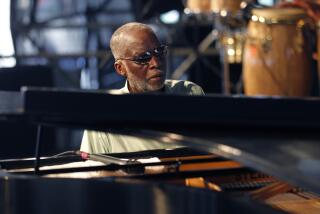Judge Stays Execution in Police Killing : Courts: He cites lack of time to complete an ongoing hearing into whether journalist should get a new trial for the 1981 slaying in Philadelphia.
- Share via
WASHINGTON — Ten days before he was scheduled to die, journalist and Death Row inmate Mumia Abu-Jamal on Monday was granted an indefinite delay of his execution for the 1981 murder of a Philadelphia police officer.
Judge Albert F. Sabo, who presided over the 1982 trial that sent Abu-Jamal to Pennsylvania’s Death Row, said there is not enough time to complete an ongoing hearing into whether the journalist deserves a new trial before the Aug. 17 execution date. Additionally, Sabo said, defense attorneys would need time to exhaust all possible appeals before Abu-Jamal can be put to death by lethal injection.
The judge, who did not set a new execution date, made clear that his decision is not a permanent reprieve for the condemned man. Rather, he said, it is an opportunity to provide due process.
“He has an absolute right to be heard by the highest court in the land--the United States Supreme Court,” said Sabo, who had declined as recently as last Thursday to stay the execution.
Leonard Weinglass, a noted civil rights attorney representing Abu-Jamal, said that appeals are in the works and that the stay is “a very heartening victory for the many thousands of people who have come out around the world in support of Mumia.”
However, officials representing the Fraternal Order of Police in Philadelphia said that the judge’s order was expected and does nothing to change the facts in the case.
“Judge Sabo is being absolutely fair,” said James McDevitt, a vice president with the police fraternity. “We have no problems with his decision because it’s only fair that Mr. Abu-Jamal go through the federal appeals process before he is executed.”
Abu-Jamal, 41, has been on Pennsylvania’s Death Row since a jury convicted him in 1982 of murdering Officer Daniel Faulkner.
According to court records, the shooting occurred before dawn Dec. 9, 1981. Abu-Jamal, a radio journalist, was moonlighting as a cab driver when he happened by and witnessed Faulkner arresting his brother, William Cook, and beating him with a flashlight.
When police arrived at the scene, Faulkner was mortally wounded, Abu-Jamal had been shot with Faulkner’s pistol and Cook was standing nearby unharmed.
Although neither Cook nor Abu-Jamal ever described what happened that morning, Abu-Jamal’s supporters have argued that another man shot Faulkner and ran from the crime scene. They also have maintained that police and other law enforcement officials suppressed evidence that would have cleared Abu-Jamal.
Authorities have said that no conspiracy occurred and have argued that Abu-Jamal received a fair trial.
Dozens of activists who claim that Abu-Jamal received an unfair trial cheered Sabo’s decision.
“A lot of pressure has built up around this case,” said Jane Henderson, a member of Equal Justice USA, a grass-roots advocacy group that has been lobbying Pennsylvania officials since 1990 to grant Abu-Jamal a new trial. “I think Sabo has gotten pressure to put off the execution.”
Henderson noted that in recent months demonstrations across the United States and in several foreign countries have focused on Abu-Jamal’s situation.
Additionally, an expanding network of social activists--including writers, entertainers, politicians, academics and journalists--has campaigned on Abu-Jamal’s behalf by sending letters, faxes and statements denouncing his planned execution.
“We know that tens of thousands of letters have come into Judge Sabo’s office every day,” Henderson said. “We’re pleased that it’s having some impact but we know we have to remain vigilant that Mumia gets a fair trial this time.”
More to Read
Sign up for Essential California
The most important California stories and recommendations in your inbox every morning.
You may occasionally receive promotional content from the Los Angeles Times.













